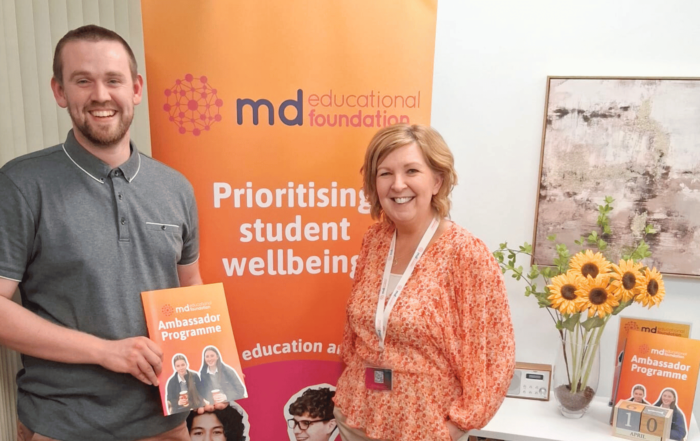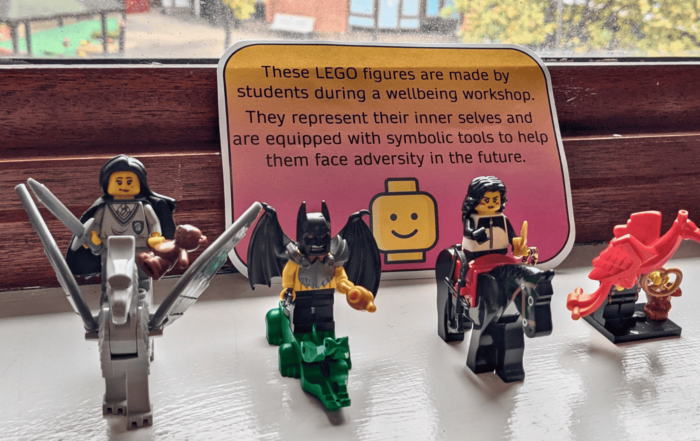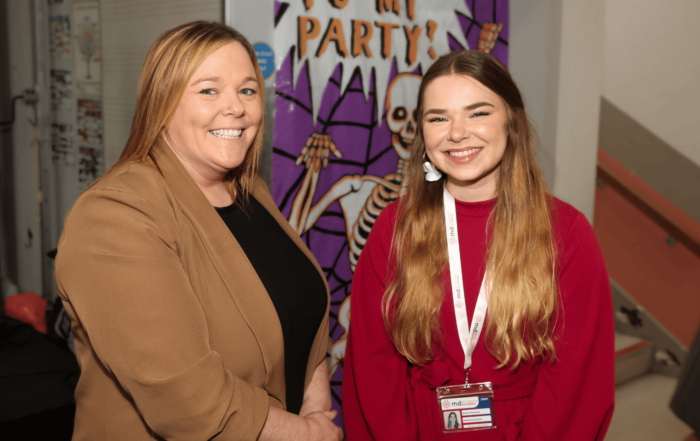Mental Health Awareness Week is a campaign, set by the Mental Health Foundation. This year’s campaign takes place from the 15th-21st of May and its theme is Anxiety. The goal is to raise awareness of anxiety – how it looks like and how to manage it.
Feeling anxious is a common feeling for many of us and it can cause different symptoms in our body and mind. Anxiety is a common mental health problem we often face – according to a survey carried out by the Mental Health Foundation, 34% of adults experienced anxiety during the previous month. According to the Mental Health Foundation, younger people are more likely to have some form of anxiety – in 2021, 16-29 year-olds were most likely to have some form of anxiety. This bracket includes post-16 education which means that many 16-18-year-old students are battling with anxiety and would need more support to manage it.

young people in Northern Ireland experiences anxiety and depression
How does anxiety affect students?
Post-16 students go through changes and challenges in their lives, which alone can cause a lot of anxiety. Common themes to cause anxious feelings amongst students can be final exams, changing friendships, plans for further education and going through big life events.
Students are affected by anxiety in their daily life, and they want support with it – they just might not have the tools to do so. According to Public Health Wales, a quarter of young people did not feel they had mental health support at school. The lack of support with stress and anxious feelings can become a deeper problem when a young person feels like they are restricted by anxiety.
Due to an extended period of anxiety, students can start to feel like they are not capable of doing things they want and need to do. They can feel like their peers are coping just fine with school and life while blaming themselves for not being able to manage in the same way. Students can find themselves struggling to learn and develop as their bodies go into a fight or flight mode due to anxiety. Anxiety might make students feel nervous, irritable and scared – it’s not always obvious if someone is feeling panicky from the inside.
How to help students with anxious feelings?
Students may feel anxious for many different reasons, depending on the individual. There are also many different approaches to help students with anxious feelings. Here are 5 tips on how to support young people with anxiety:
- Normalise anxiety: Talk openly about stress and anxious feelings – help students to recognise the signs that they are getting anxious, and let them know that they are not alone. By taking part in the Mental Health Awareness Week, you can get a lot of free resources to get ideas on how to normalise anxiety amongst students. Visit the Mental Health Foundation‘s website to access these resources.
- Toolbox for anxiety: Provide students with tools to manage anxiety, such as this student guide by Anxiety UK and activities that can help them to reduce anxiety, such as these 10-minute techniques shared by Mental Health UK.
- Reduce fear of failure: Listen to students and their fears when it comes to exams and further education – responding rather than reacting to students’ anxious feelings can help to show them that their feelings are valid.
- Safe space: Create a calm space where young people can express their anxiety without fear of judgement, practice relaxing mindfulness activities and checking-in with themselves with the Check-In Bingo, created by the Mental Health Foundation for the Mental Health Awareness Week.
- Professional support: Provide students with a designated wellbeing professional who can be there to listen to the students, validate their feelings and help to support their wellbeing by providing counselling and enrichment activities.
How can we help and what is mdeducational foundation doing to prevent anxiety amongst young people?
mdeducational foundation’s mission is for all post-16 students to feel supported in every aspect of their wellbeing and know they’ll never have to face mental health problems alone. Our approach is to provide schools in the UK and Ireland with the opportunity of salary funding to place a dedicated wellbeing professional into their educational setting and promote the wellbeing of their students.
We have identified that many students in post-16 educational settings are affected by anxiety and would need extra support to manage it. Our Wellbeing Leads help students in their schools to feel heard and supported in every aspect of their mental health, including anxiety. They offer different approaches to help with anxiety, such as mindfulness activities at the Wellbeing Hubs, counselling, music therapy and other enrichment activities.
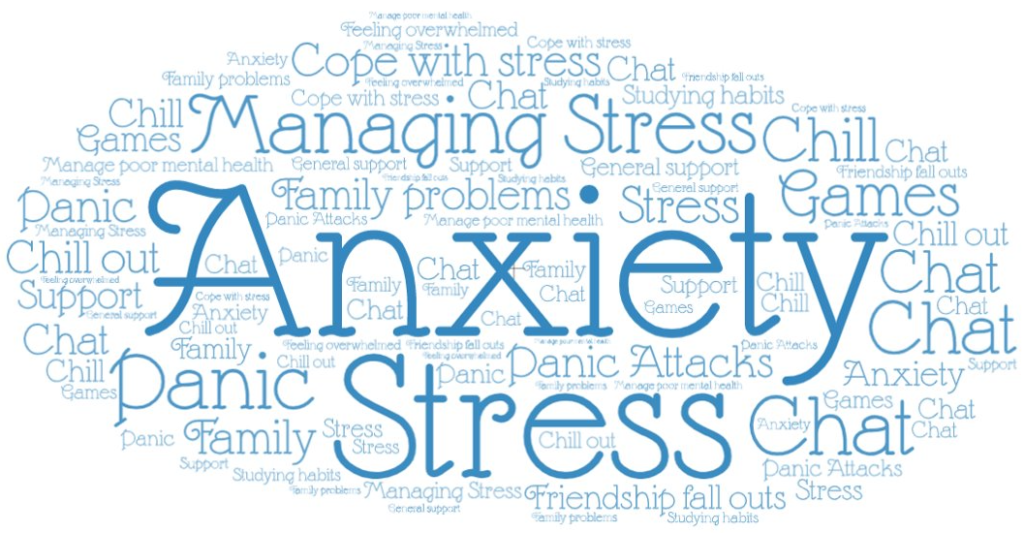
Students from a school in England were asked what they need support with when it comes to improving their wellbeing – in the shape of a word cloud, it is obvious that students need help with their anxiety and stress.
Wellbeing Leads provide students with an accessible safe place to come and feel validated. As one student from a school in England said, “It’s a place where no matter who you are you can be emotional and you won’t be judged”. Based on the students’ needs, Wellbeing Leads can provide and host workshops to help young people with the mental health struggles they are currently battling with – without delay. Here are 5 workshop ideas from one of our Wellbeing Leads.
One of these wellbeing workshop ideas is Worry Buckets. This exercise can help students recognise where their anxious feelings are coming from and actively find ways to cope with them. The idea is to draw a bucket as shown in the picture and start by listing down warning signs around the red flag. How do anxious feelings affect your mind and body? Do you start to feel lightheaded or bite your lips? Next, write down things that are creating stress in your life in the bucket. Are you scared to move to another city or pass your final exams? Finally, we move to helpful and harmful coping strategies, the taps – under both taps, think about what could help you with the anxious feelings or increase the worries. Maybe attending events in the new city could help to find new friends and relieve stress while avoiding new activities can cause the feeling of not belonging in the new city. With this Worry Bucket, students can visualise their anxious feelings but at the same time rationalise them as they find ways to relieve the feelings with different coping strategies.
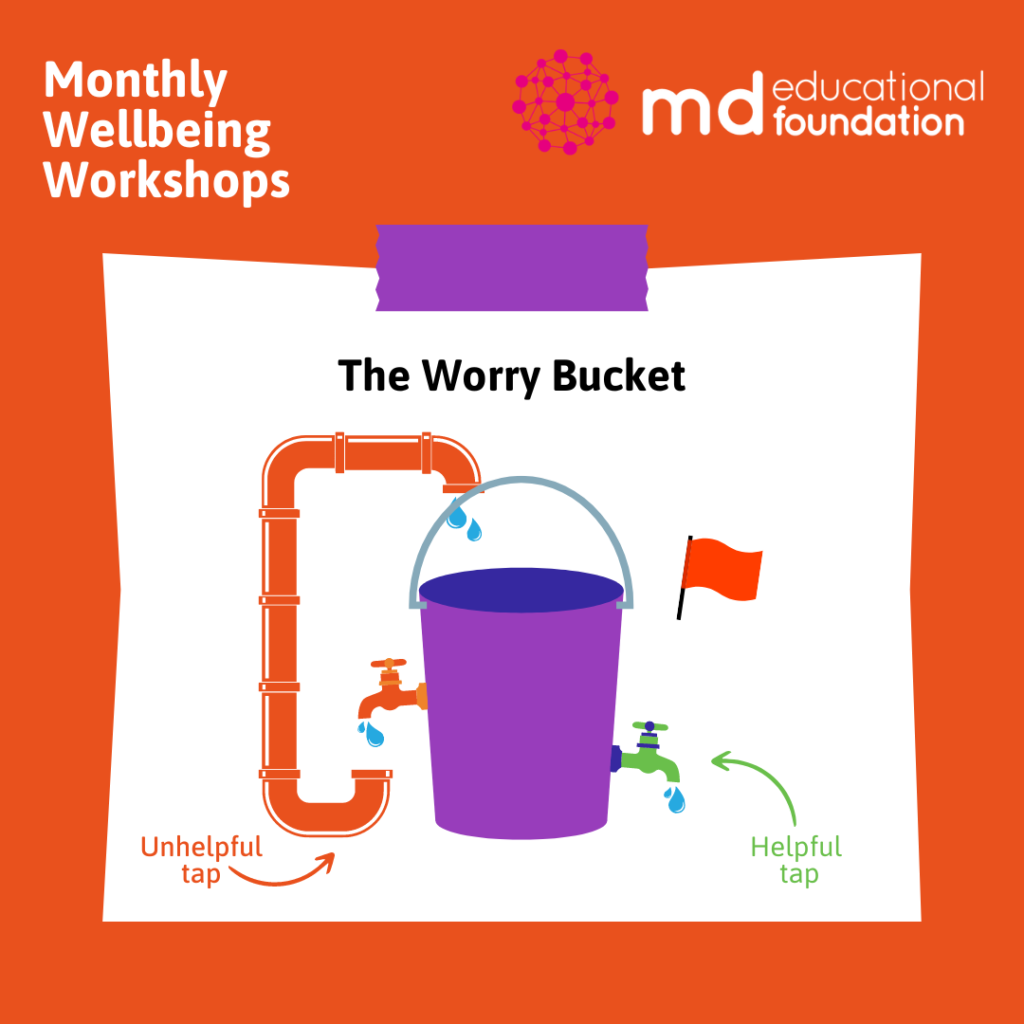
Does your school need support with improving the wellbeing of the students? Learn more about our approach and get the process started by completing a short Expression of Interest form.
Join the conversation #ToHelpMyAnxiety and learn more about Mental Health Awareness Week by visiting mentalhealth.org.uk.
Prioritising student wellbeing through education and beyond
mdeducational foundation is a charity that provides a three-year salary-funded commitment to placing dedicated wellbeing professionals within educational settings, enabling them to kickstart their long-term wellbeing strategies.
Related posts
Championing student wellbeing: Meet James Sweeney, the first mdeducational foundation Ambassador
At mdeducational foundation, we’re committed to prioritising student wellbeing - and now, we’re continuing that mission by inviting members of our community to join us in championing a brighter future for young people. We’re [...]
6 mental health workshops to support and improve the wellbeing of young people in schools
Wellbeing workshops are a great way to promote positive wellbeing, encourage young people to look after their mental health and remove the stigma around mental health and wellbeing. In schools, workshops can provide many [...]
Shining the spotlight on student wellbeing: Meet Susanna Neuvonen, Marketing Executive at mdeducational foundation
At mdeducational foundation, we’re dedicated to prioritising student wellbeing by providing fully funded support in schools and educational settings across the UK and Ireland. Our mission is to ensure that all post-16 students feel supported [...]

